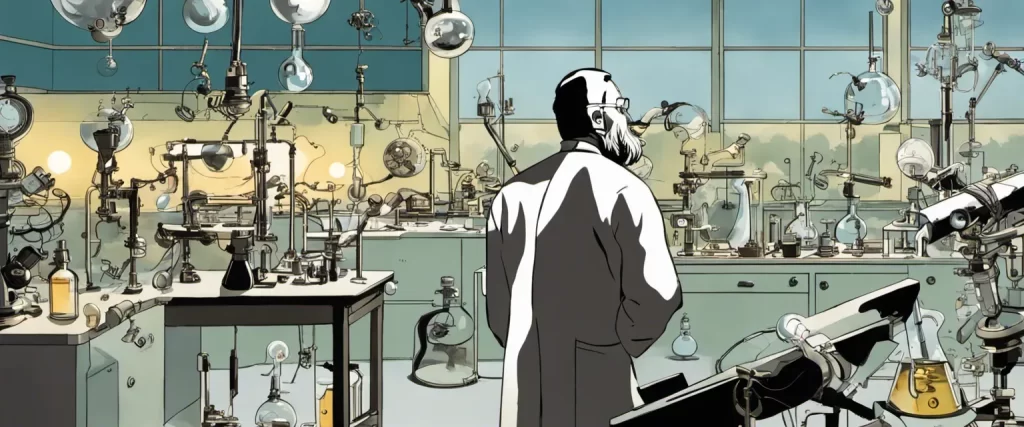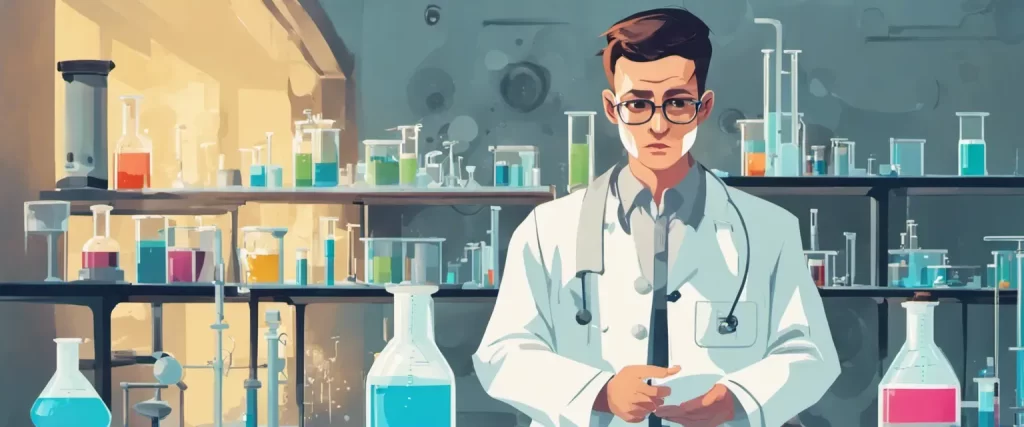Frankenstein: Unraveling Dark Side of Science

In the realm of literature, few works have captured the awe-inspiring power of science like Mary Shelley’s iconic novel, Frankenstein. Published nearly two centuries ago, Shelley‘s cautionary tale has served as a timeless reminder of the double-edged sword that scientific progress can become. Through the chilling story of the ambitious Victor Frankenstein and his quest for knowledge and creation, Shelley delves deep into the human condition, provoking thought-provoking questions about the limits of science, the pursuit of knowledge, and the consequences of tampering with the mysteries of nature. As we embark on a journey to explore the intricate relationship between science and society, we turn to Shelley’s magnum opus, Frankenstein, as a guiding light, shining upon the moral and ethical dilemmas that continue to haunt us in our modern age of scientific breakthroughs.
What is Science
Science is a systematic and organized way of acquiring knowledge and understanding the world around us. It involves observing, experimenting, and analyzing data to develop theories and laws that explain natural phenomena. Science is based on empirical evidence and relies on the use of logical reasoning and critical thinking to arrive at conclusions. It is a dynamic field that constantly evolves as new evidence is discovered and theories are refined. Science encompasses various disciplines, such as physics, chemistry, biology, astronomy, and many others, each contributing to our understanding of the natural world.
Why is Science Important to Us?
Science is important to us for several reasons:
1. Understanding the natural world: Science helps us understand how the world works and allows us to explain natural phenomena, such as why the sky is blue or how gravity works. This understanding allows us to make informed decisions about our environment and the resources we use.
2. Technological advancements: Science drives technological advancements that improve our quality of life. From medical breakthroughs to innovations in communication and transportation, science plays a crucial role in shaping the modern world.
3. Problem-solving and critical thinking: Science encourages problem-solving and critical thinking skills. It teaches us to ask questions, gather evidence, analyze data, and make logical conclusions. These skills are applicable not only in scientific endeavors but also in various aspects of life.
4. Health and wellbeing: Science plays a vital role in healthcare and public health. It enables the development of innovative medicines, diagnostic tools, and treatment methods that save lives and improve the overall health of individuals and communities.
5. Economic growth and innovation: Scientific discoveries lead to economic growth and innovation. They drive the development of new industries, create job opportunities, and contribute to economic prosperity.
6. Environmental sustainability: Science provides us with the knowledge and tools to address environmental challenges. It helps us understand climate change, conservation strategies, and sustainable practices, allowing us to make informed decisions to protect our planet.
Overall, science is a fundamental part of our lives, helping us understand the world around us, solve problems, and improve our quality of life.
Unlocking Science from Frankenstein

Frankenstein Introduction
Frankenstein by Mary Shelley is a classic gothic novel published in 1818. The story follows Victor Frankenstein, a young scientist who becomes obsessed with creating life. Using his knowledge of science and alchemy, Frankenstein successfully brings to life a creature made of body parts stolen from graves. However, upon seeing the hideous nature of his creation, Frankenstein is filled with horror and guilt, abandoning the creature to its own devices.
The creature, referred to as the Monster, is left to fend for himself in a world that rejects and despises him. Lonely and seeking companionship, the Monster tries to integrate into society but is met with fear and violence. It becomes increasingly resentful toward its creator and seeks revenge by causing pain and misery in Frankenstein’s life.
The novel explores themes of ambition, the consequences of playing God, the nature of humanity, and the pursuit of power. Through Frankenstein’s journey and the Monster’s plight, Shelley raises questions about the ethical implications of scientific advancement and the power dynamics between creators and their creations.
Frankenstein is a cautionary tale that highlights the dangers of unchecked ambition and the responsibilities that come with wielding knowledge and power. It delves into the complexities of human nature, empathy, and the ways society can shape individuals.
Science Methods
In the novel “Frankenstein” by Mary Shelley, several scientific methods and concepts are mentioned. Here are some of the key ones:
1. Galvanism: Galvanism refers to the application of electric currents to stimulate muscle contractions. In the book, Victor Frankenstein becomes fascinated with galvanism and experiments with bringing the dead back to life using electricity.
2. Chemistry: Chemistry is a central scientific discipline in the novel. Victor Frankenstein studies chemistry extensively, especially when trying to create life. He experiments with various chemical reactions and methods to create his creature.
3. Anatomy: Anatomy plays a significant role in the novel as Victor Frankenstein desires to create a being from body parts. He dissects and gathers body parts from various sources, focusing on the human anatomy in his pursuit.
4. Alchemy: Although not explicitly mentioned, “Frankenstein” indirectly references the concept of alchemy. Alchemy was an ancient pseudo-scientific tradition focused on transforming substances, including the creation of the mythical philosopher’s stone. Victor’s pursuit of creating life can be seen as related to the transmutation goals of alchemy.
5. Natural philosophy/Natural sciences: Throughout the novel, Victor Frankenstein is portrayed as a natural philosopher, which was a term used in Shelly’s time to refer to someone involved in the scientific inquiry of nature. This encompasses a range of scientific disciplines, including physics, biology, and chemistry.
These methods and scientific concepts reflect the 19th-century fascination with scientific progress, discovery, and the blurring of ethical boundaries in pursuit of knowledge.
Frankenstein Quotes
Frankenstein quotes as follows:
1. “Beware; for I am fearless, and therefore powerful.”
2. “Life, although it may only be an accumulation of anguish, is dear to me, and I will defend it.”
3. “If I cannot inspire love, I will cause fear!”
4. “A human being in perfection ought always to preserve a calm and peaceful mind and never to allow passion or a transitory desire to disturb his tranquillity.”
5. “Learn from me, if not by my precepts, at least by my example, how dangerous is the acquirement of knowledge and how much happier that man is who believes his native town to be the world than he who aspires to become greater than his nature will allow.”
6. “The world to me was a secret, which I desired to divine.”
7. “Nothing contributes so much to tranquillize the mind as a steady purpose—a point on which the soul may fix its intellectual eye.”
8. “Even broken in spirit as he is, no one can feel more deeply than he does the beauties of nature.”
9. “I am malicious because I am miserable.”
10. “I have love in me the likes of which you can scarcely imagine and rage the likes of which you would not believe. If I cannot satisfy the one, I will indulge the other.”

More Books About Science
1. What Is This Thing Called Science” by Alan F. Chalmers
Alan F. Chalmers provides a comprehensive introduction to the philosophy of science in this captivating book. By dissecting key concepts, such as scientific observation, experimentation, and theory construction, Chalmers offers readers a deeper understanding of how science really works. This book is a must-read for anyone interested in exploring the fundamental underpinnings of scientific knowledge.
2. The Structure of Scientific Revolutions” by Thomas S. Kuhn
In this groundbreaking work, Thomas S. Kuhn revolutionized how we perceive scientific progress. By highlighting the role of paradigm shifts in scientific disciplines, Kuhn challenges traditional notions of objective truth and emphasizes the inherently social nature of scientific advancement. Exploring both the history of science and the sociology of knowledge, this book invites readers to reflect critically on the scientific enterprise.
3. Einstein: His Life and Universe” by Walter Isaacson
Walter Isaacson’s biography offers an in-depth portrait of one of the greatest scientific minds in history – Albert Einstein. By delving into Einstein’s personal life, scientific achievements, and the revolutionary ideas embedded in his theory of relativity, Isaacson paints a comprehensive picture of a man whose discoveries transformed our understanding of the universe. This book not only provides an illuminating exploration of Einstein’s life but also captures the spirit of scientific inquiry itself.
4. The Immortal Life of Henrietta Lacks” by Rebecca Skloot
The Immortal Life of Henrietta Lacks” tells the gripping story of the woman behind one of the most important cell lines in medical research – HeLa cells. Rebecca Skloot explores the ethical and scientific implications surrounding the harvesting of Lacks’ cells without her knowledge or consent. This book not only introduces readers to groundbreaking scientific research but also raises thought-provoking questions about medical ethics, consent, and the interplay between science and humanity.
5. The Gene: An Intimate History” by Siddhartha Mukherjee
Siddhartha Mukherjee takes readers on a captivating journey through the history of genetics, providing a comprehensive exploration of the fundamental building blocks of life. From the discovery of DNA to the ethical challenges posed by genetic engineering, this book skillfully navigates scientific advancements and their impact on society. Mukherjee’s engaging narrative makes complex ideas accessible, making “The Gene” a must-read for anyone seeking a deeper understanding of genetics and its implications.
These five books provide a diverse range of perspectives on science, delving into its philosophical foundations, historical evolution, and ethical dimensions. Together, they offer readers a comprehensive exploration of the scientific enterprise and its impact on society.



0 Comments